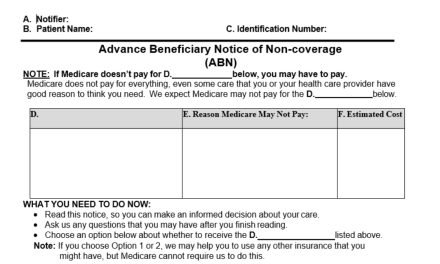
FAA Examinations Update

NEW ICS Interpretation Regarding Illinois Licensed Chiropractic Physicians Performing FAA Examinations for Recreational Pilots
The ICS has revised its initial interpretation of the Federal Aviation Administration’s (FAA) new rule – the “BasicMed” rule — that allows non-commercial or “recreational” pilots to obtain a different type of medical certification than commercial pilots. Based on a detailed review, the ICS now believes that Illinois licensed chiropractic physicians may perform non-commercial pilot exams, so long as the D.C. does not make any recommendations regarding the examinee’s usage or non-usage of prescription drugs.
Before the new rule, the FAA rules required private, recreational, and student pilots, as well as flight instructors, to file the same medical certificate as a commercial pilot. All of these applicants were required to undergo a physical examination with an FAA-designated Aviation Medical Examiner, who could be only a medical or osteopathic physician. Under the newly adopted rule, non-commercial pilots may now opt to follow the BasicMed procedure instead. Under BasicMed, a non-commercial pilot may use a state-licensed physician, using the Comprehensive Medical Examination Checklist on the FAA form, instead of having the exam by an FAA-designated Aviation Medical Examiner. Because doctors of chiropractic are state-licensed physicians in Illinois, the ICS was asked to review whether they are included in the types of physicians permitted to perform the BasicMed exam in Illinois for non-commercial pilots.
Initial ICS Interpretation
The ICS initially interpreted the BasicMed rule as not permitting Illinois doctors of chiropractic to perform these exams, due to a little-known subsection of the rule that requires the physician to discuss all prescription (and nonprescription) drugs the individual reports taking and the drugs’ potential to interfere with the safe operation of an aircraft or motor vehicle. When the ICS wrote the initial opinion, we were under the impression that the rule required the examining physician to advise or make recommendations to pilot applicants about stopping or maintaining their prescription drugs, which is not within chiropractic scope under Illinois law.
New ICS Interpretation
However, a closer analysis reveals that the rule simply requires the examining physician to “Discuss all drugs the individual reports taking (prescription and nonprescription) and their potential to interfere with the safe operation of an aircraft or motor vehicle.” When reading together the FAA rule, similar DOT rules concerning commercial driver’s license exams, and the Illinois Medical Practice Act, the ICS believes that the limited discussion of prescription drugs required for the FAA exam is within chiropractic scope in Illinois, so long as the D.C. limits the discussion to the impact of the drug on a person’s ability to safely operate an airplane or motor vehicle, and makes no recommendations to examinees regarding taking or not taking their prescription medications.
Chiropractic Physician’s Role in Assessing Impact of Prescription Drug Use in FAA and DOT Exams
To review the BasicMed FAA rule, it is helpful to compare it to the DOT rule that allows chiropractic physicians to examine and certify medical fitness of an applicant for a commercial driver’s license (CDL trucker’s license). In both cases, examiners are instructed to review the applicant’s health history, as well as the applicant’s medications, both prescription and OTC.
The review of these medications is critical because the purpose of the exam is for the physician to assess the applicant’s fitness to safely operate the vehicle or aircraft. If the applicant discloses the use of a particular medication, or if the applicant demonstrates by appearance or conduct that he or she is under the influence of a medication that would render the applicant unfit, the physician must use that information to deny the certification. As the approved medical examiner, the physician is the gatekeeper to protect public safety by evaluating these applicants.
Performing this assessment is within the existing chiropractic scope in Illinois, as defined in the Medical Practice Act. The Act describes chiropractic scope as “the treatment of human ailments without the use of drugs and without operative surgery.” The chiropractic scope explicitly includes recommendations regarding OTC products. Regarding prescription medications, chiropractic physicians who act as DOT or FAAmedical examiners are not using prescription drugs to test or treat their patients, nor are they making recommendations regarding use; rather, chiropractic physician examiners are being asked in these limited circumstances to discuss the impact that the use of the applicant’s prescription medication could have on a person’s ability to safely operate a truck or an aircraft.
Use Caution not to Exceed Scope
Although DCs can have conversations regarding the impact certain drugs may have on a person’s fitness to safely perform certain tasks, chiropractic physicians must be extremely cautious not to exceed their scope. It would be beyond the scope for a DC to directly advise a patient to use or not use a prescription medication, when flying, driving, or at any time. Additionally, when providing information to a patient who currently uses a medication, DCs should be very cautious not to persuade or imply, that a patient cease taking prescription medications. Instead, if the situation warrants a recommendation for further action regarding prescription medications, the DC should direct the patient to see his or her prescriber.
For example, if an applicant presents at the exam under the influence of oxycodone, prescribed by another physician, the chiropractic physician medical examiner could determine that the applicant is unfit and deny the certification. However, the chiropractic physician could not advise the applicant to stop taking, or to continue taking, the medication. Any such direct or implied recommendation would exceed the scope of the license. If the chiropractic physician believes the applicant needs further review of his or her oxycodone use, the physician should recommend that the patient see, or refer the patient to, a medical or osteopathic doctor.
Examples of Permitted and Prohibited Statements by D.C. Examiners
For the patient who takes prescription oxycodone or other performance-altering prescription medications, here are some examples of chiropractic physician examiner statements that may be permitted or prohibited:
- “Based on my examination of the systems listed on the form and my observation of you, I believe you have a medical condition that could interfere with your ability to safely operate an aircraft. Therefore, I cannot sign the certification.” This statement is within chiropractic scope and is permitted. The examiner is assessing the applicant’s medical ability to safely operate an airplane but is not making a recommendation to the applicant to stop or continue usage of prescription drugs.
- “Because you have a prescription for oxycodone, here are the possible effects of oxycodone that can occur while a person is flying an airplane, which you need to be aware of. If you have specific questions, consult your prescriber.” This statement appears to meet the requirements for the FAA rules, the medical form and chiropractic scope of practice under the Medical Practice Act. The D.C. examiner has not made any recommendation regarding whether the examinee should use or not use the oxycodone.
- “Because you have a prescription for oxycodone, here are possible effects oxycodone presents when flying. You should stop taking the drug.” This statement would not be permitted, because it contains a recommendation regarding the stopping of a prescription medication.
- “Because you have a prescription for oxycodone, here are possible effects of oxycodone while flying an airplane. You need to consider not taking this medication prior to flying.” This statement would not be permitted because it makes a recommendation about an individual’s usage of a prescription drug.
- “Because you have a prescription for oxycodone, here are the possible effects of oxycodone while flying. I can’t tell you to take or not take it, but you need to be careful when using this drug.” The ICS believes this is not permitted, because it makes a strong implication about usage by a specific individual; thus, such a statement would be outside of chiropractic scope. However, you could instead use language similar to #2 above.
The ICS believes this interpretation of the FAA (and DOT) rules is consistent with existing chiropractic scope of practice under the Medical Practice Act. We also believe this interpretation is consistent with that of other states whose D.C.s hold physician status. Additionally, because the DOT and FAA regulations instruct all qualified medical examiners to discuss the use of drugs and their impact on the operation of an aircraft or motor vehicle, it appears these federal regulations contemplate chiropractic physicians doing so. However, neither the DOT nor the FAA regulations change the state-defined scope of practice, and chiropractic physicians are still not permitted to use, nor recommend the use or non-use, of any prescription medications.
Conclusion
One notable difference between the DOT and FAA rules is that DOT requires the physician to become certified as a DOT Medical Examiner, while the FAA rules do not require additional certification beyond a state physician license. In both cases, however, the government has affirmed the status of chiropractic physicians as highly qualified health care professionals who are entrusted with the duty to protect public safety.
The Comprehensive Medical Examination Checklist may be found at: https://www.faa.gov/documentLibrary/media/Form/FAA_Form_8700-2_.pdf
The general FAA web page concerning BasicMed, with links to forms and other information, may be found at: https://www.faa.gov/licenses_certificates/airmen_certification/basic_med/



















